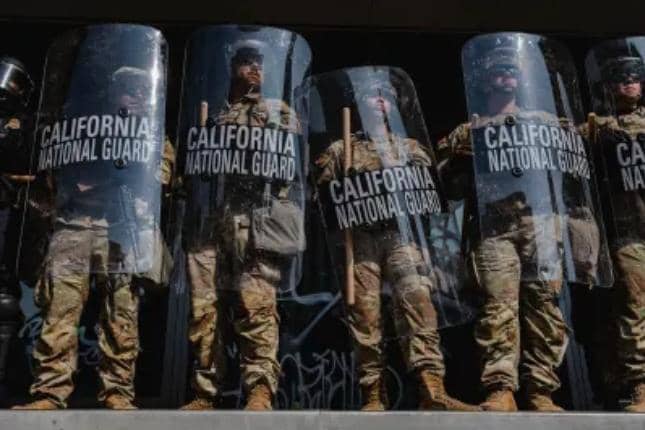(DDM) – A high-stakes legal battle over President Donald Trump’s decision to deploy the National Guard to Los Angeles is set to unfold in a California courtroom today.
Diaspora Digital Media (DDM) gathered that the case centers on whether the president violated a 147-year-old law by sending troops to quell protests against immigration raids, despite the objections of California Governor Gavin Newsom.
The dispute began in June, when hundreds of protesters took to the streets of Los Angeles to condemn a series of immigration raids.
The raids targeted workplaces, leading to the detention or deportation of dozens of individuals, sparking outrage among immigrant communities and rights groups.
Amid the demonstrations, President Trump invoked the Insurrection Act, a rarely used statute dating back to 1878, which allows the federalization of the National Guard during rebellion, invasion, or when regular forces cannot enforce US laws.
Under this order, 4,000 National Guard members and a small contingent of US Marines were sent to the city.
Governor Newsom, backed by local officials and police chiefs, argued that the deployment would inflame tensions and disrupt local policing efforts.
He claimed California’s security forces were fully capable of maintaining order without federal military involvement.
In court filings, the president’s legal team countered that the troops’ duties were limited to safeguarding federal buildings, courthouses, and personnel, with strict orders to avoid direct contact with protesters.
They maintained that no law enforcement actions were taken by federalized troops, and their presence was purely protective.
Legal experts say the outcome may hinge on how the court interprets the scope of the Insurrection Act in modern contexts.
Historically, the law has been invoked sparingly, during the 1957 Little Rock school desegregation crisis, in the 1992 Los Angeles riots, and after Hurricane Katrina in 2005.
In each case, presidents argued federal intervention was necessary to restore order or protect civil rights.
Critics warn that Trump’s action could set a precedent for bypassing state authority in politically charged situations, effectively giving presidents broader discretion to send troops into states without consent.
Supporters, however, insist the deployment was a lawful measure to prevent violence and protect federal assets during volatile protests.
Beyond the courtroom, the case has sparked national debate over federalism and executive power.
Immigration advocates view the deployment as an intimidation tactic aimed at silencing dissent, while Trump’s allies see it as decisive leadership in protecting the nation’s laws.
Governor Newsom has vowed to exhaust all legal options to reverse the order, framing the case as a test of state sovereignty.
The judge’s ruling, expected within weeks, could shape the boundaries of presidential authority for years to come, influencing how future administrations handle civil unrest.
For now, Los Angeles remains at the center of a constitutional standoff whose implications stretch far beyond California’s borders.







